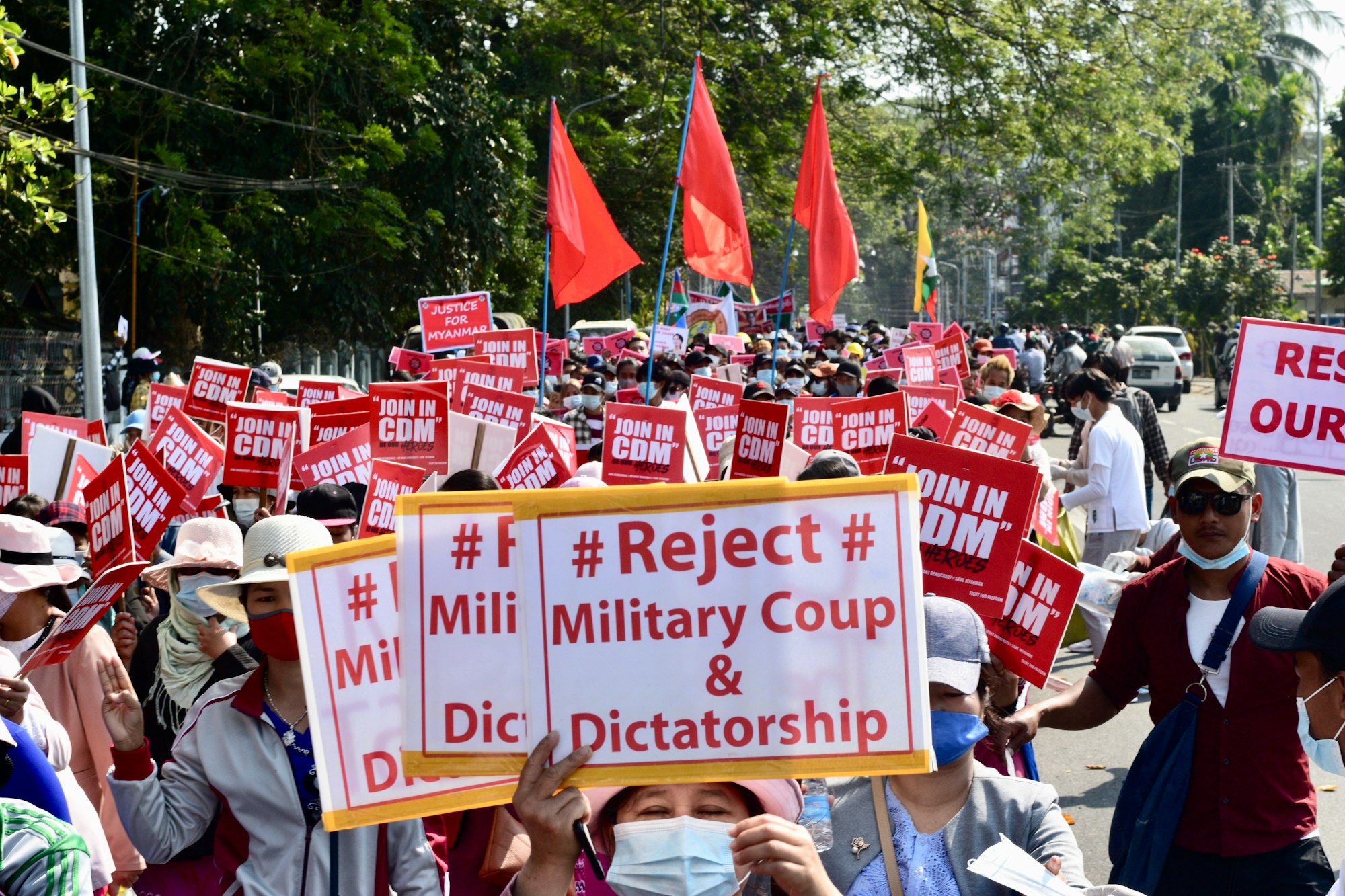THE MERIDIAN: Malaysia at the Crossroads of U.S.-China Tech Rivalry
Malaysia faces dual pressures: U.S. demands over Nvidia chip controls and MAHB cyberattack, while Trump administration struggles with fallout from Signal breach. Regional tensions heighten as Chinese hackers target Asian telecoms.

Critical Mid-Week Brief
March 26, 2025
- Malaysia faces mounting U.S. pressure to control Nvidia chip flows amid $390M fraud case linking Singapore to China via Malaysia
- MAHB confirms cyberattack on corporate networks, highlighting vulnerabilities in critical national infrastructure
- Chinese state-sponsored hackers compromised an Asian telecom for four years using sophisticated persistence techniques
- Kuala Lumpur temple controversy resolved with relocation agreement, defusing potential religious tensions
- South Korea battles "unprecedented" wildfires with 18 dead and thousands of hectares burned across southeastern region
- Trump administration faces bipartisan criticism over Signal security breach revealing sensitive military operations
REGIONAL FOCUS: Malaysia Pressured to Stem Flow of Advanced AI Chips to China
Malaysia faces mounting pressure from Washington to tighten controls on high-end Nvidia semiconductor movements as part of a broader campaign to prevent China from acquiring advanced AI capabilities. Trade Minister Zafrul Aziz revealed the U.S. is demanding Malaysia "monitor every shipment" of Nvidia chips entering the country amid suspicions of illicit transfers to China.
Key Developments:
- Malaysia has formed a special task force to strengthen regulations around its growing data centre sector
- The controversy follows Singapore's recent arrest of nine individuals in a $390 million fraud case involving servers containing Nvidia chips allegedly destined for China via Malaysia
- Malaysia has emerged as one of the fastest-growing markets for data centre development, attracting $25 billion in investments from Nvidia, Microsoft, and ByteDance
Strategic Context: This represents a critical front in the U.S.-China technology competition, with Malaysia increasingly caught between competing superpowers in the semiconductor supply chain.
INFRASTRUCTURE ALERT: Malaysia Airports Holdings Berhad Faces Cyber Attack
Malaysia Airports Holdings Berhad (MAHB) has confirmed a cyber attack on its corporate network, though it maintains that airport operations and safety systems remain unaffected. The aviation company, which operates 39 airports across Malaysia including Kuala Lumpur International Airport (KLIA), has activated its cyber incident response protocols and engaged external cybersecurity experts.
Situation Overview:
- MAHB detected the breach in its corporate information technology systems on Tuesday
- The company has isolated affected systems and implemented containment measures
- Airport operations, including passenger processing, flight operations, and safety systems, continue to function normally
- Investigations are ongoing with assistance from Malaysia's National Cyber Security Agency (NACSA)
Key Concern: This incident follows a growing pattern of cyber attacks targeting critical national infrastructure in Southeast Asia, raising questions about the region's cybersecurity preparedness amid escalating digital threats.
TECHNOLOGY & SECURITY: Chinese Hackers Breach Asian Telecom Provider
A major Asian telecommunications company suffered a four-year breach by Chinese state-sponsored hackers, according to cybersecurity firm Sygnia. The threat actor, tracked as "Weaver Ant," used sophisticated web shells and tunneling techniques to maintain persistent access and conduct cyber espionage operations.
Technical Insights:
- Attackers exploited a misconfiguration in a public-facing application to gain initial access
- The hackers deployed two web shells: China Chopper and a previously undocumented tool called "INMemory"
- The breach came to light as China's Ministry of State Security accused four Taiwanese individuals of conducting cyber attacks against mainland targets
Assessment: The incident underscores the vulnerability of critical telecommunications infrastructure and the persistent nature of state-sponsored cyber threats in the region.
DOMESTIC FOCUS: Kuala Lumpur Temple Controversy Resolved
The Dewi Sri Pathrakaliamman Temple will be relocated following an agreement with Kuala Lumpur City Hall, defusing a potentially volatile religious and cultural dispute. The temple, reportedly built in 1893, sits on land sold to Jakel Group in 2014, which plans to build the Madani Mosque on the site.
Context & Resolution:
- Prime Minister Anwar Ibrahim emphasised rule of law while ensuring respectful relocation of the temple
- The temple committee confirmed the new site is "nearby and within the area of Jalan Masjid India"
- Technical details will be finalized in meetings between the temple committee and city authorities
- The groundbreaking ceremony for the mosque is scheduled for Thursday with the Prime Minister officiating
Broader Significance: The case represents the delicate balance Malaysian authorities must strike between legal requirements, religious sensitivities, and historical claims in a multicultural society.
GLOBAL FLASHPOINT: South Korea Battles "Unprecedented" Wildfires
At least 18 people have died and nearly 20 injured as wildfires rage across South Korea's southeastern region. The Korea Forest Service reports five active wildfires that have burned more than 17,000 hectares (42,000 acres) and destroyed hundreds of structures, including the 1,000-year-old Gounsa Buddhist temple in Uiseong county.
Critical Details:
- The fires began Friday in Sancheong county before spreading to neighbouring areas
- South Korea's acting President Han Duck-soo described the fires as "exceeding both existing prediction models and earlier expectations"
- Authorities have issued emergency alerts for UNESCO World Heritage site Hahoe Folk Village as the blaze approaches
- The military has deployed 5,000 service members and 146 helicopters to assist firefighting efforts
Analysis: The disaster highlights growing climate vulnerability in East Asia and will test South Korea's emergency response capabilities during a sensitive political transition period.
NATIONAL SECURITY: Signal Security Breach Reveals Trump Administration Vulnerabilities
A stunning security breach exposed high-level military planning when Atlantic editor-in-chief Jeffrey Goldberg was inadvertently added to a Signal group chat discussing imminent strikes against Houthi targets in Yemen. National Security Adviser Mike Waltz established the encrypted messaging group with Vice President J.D. Vance, Defence Secretary Pete Hegseth, Secretary of State Marco Rubio, and other senior officials. The White House has acknowledged the breach but maintains it had "no impact" on the March 14 operation.
Key Developments:
- Senate Intelligence Committee hearing turned contentious as DNI Gabbard and CIA Director Ratcliffe faced sharp questioning
- Democratic Senator Ron Wyden called for resignations "starting with the national security adviser and the secretary of defence"
- Senator Mark Warner described the incident as "sloppy, careless, incompetent behaviour, particularly toward classified information"
- Republican Representative Don Bacon, a retired Air Force general, stated the breach "put lives at risk" and officials should "own up to it"
- National Security Adviser Waltz took "full responsibility" for the breach in a Fox News interview while maintaining no classified information was shared
- Defence Secretary Hegseth's claim that "no one had texted war plans" was directly contradicted by Goldberg, who called it "a lie"
Expert Assessment: Cybersecurity specialists note that even Signal's strong encryption offers little protection if devices themselves are compromised by nation-state actors, raising questions about the fundamental security of sensitive communications conducted on personal devices.
Looking Ahead: The House of Representatives will hold its annual "Worldwide Threats" hearing today where Democratic lawmakers plan to pursue further questioning about the incident. The breach could overshadow Defence Secretary Pete Hegseth's first trip to Asia this week, where he is scheduled to meet counterparts in Japan and the Philippines.
The Meridian delivers concise mid-week pulse analysis of emerging developments that shape strategic decision-making. For more comprehensive coverage, see our weekly reports.
Thank you for your subscription. Your investment in our tiered membership enables us to deliver the actionable intelligence and analysis that informs your operational decisions. We value your commitment to quality analysis.
Strategic intelligence is more valuable when shared. Introduce colleagues to The Deep Dive and our briefing service for the regional insights that inform critical decisions.
ICYMI: Exclusive access to paid subscribers only...













